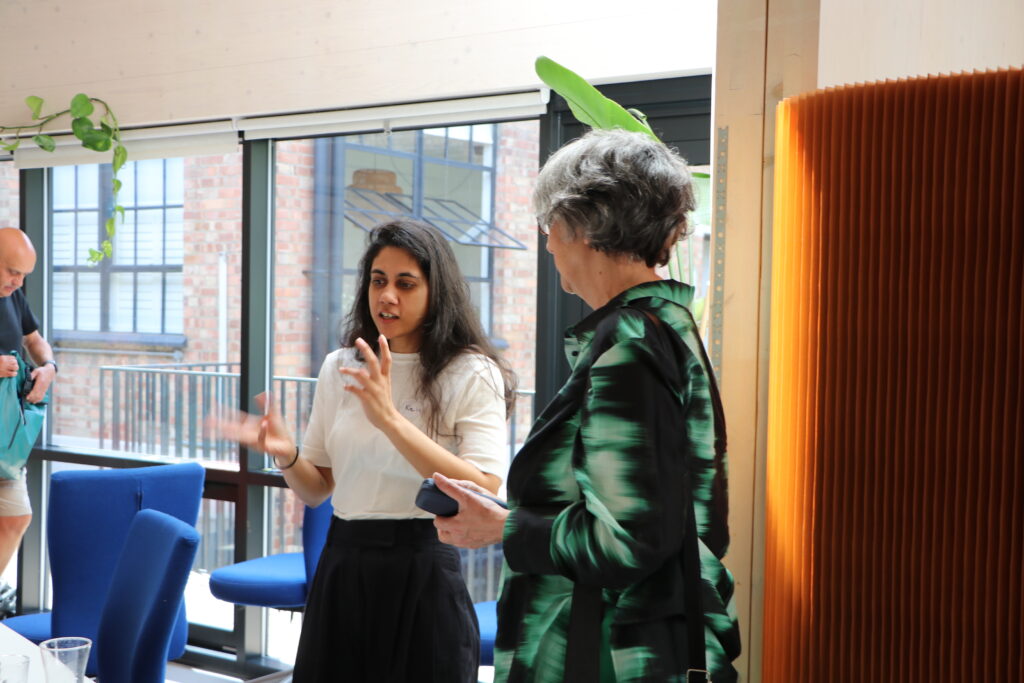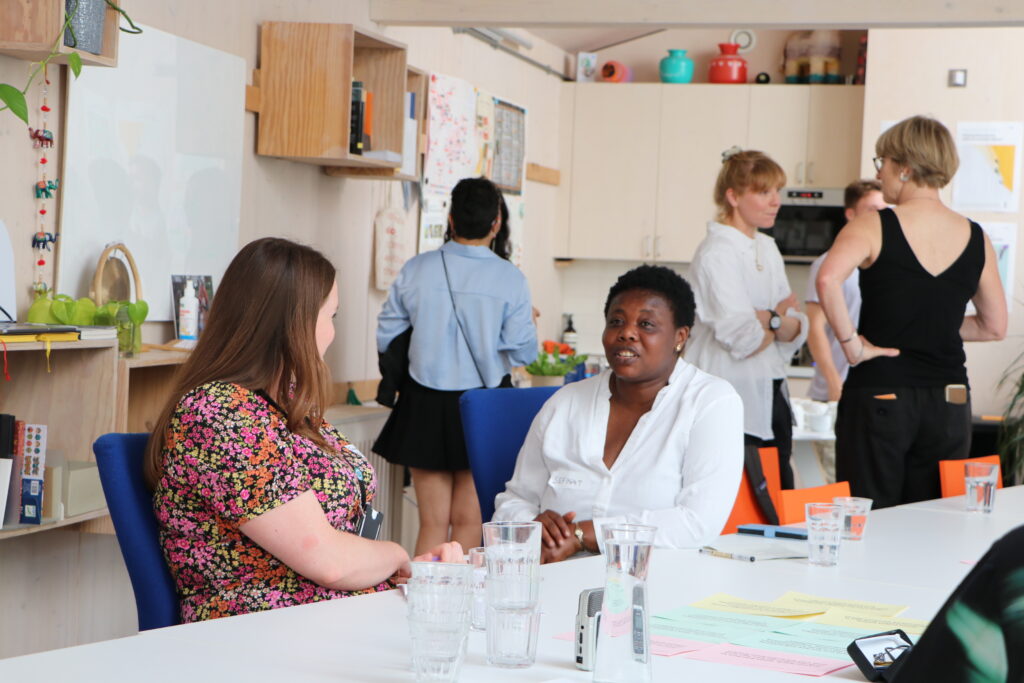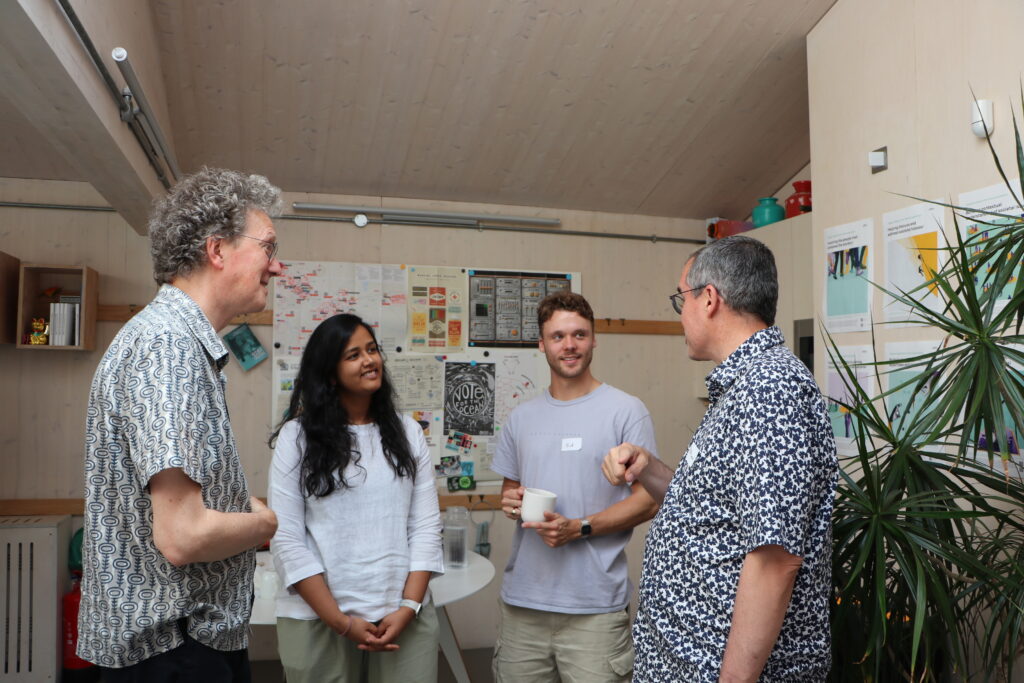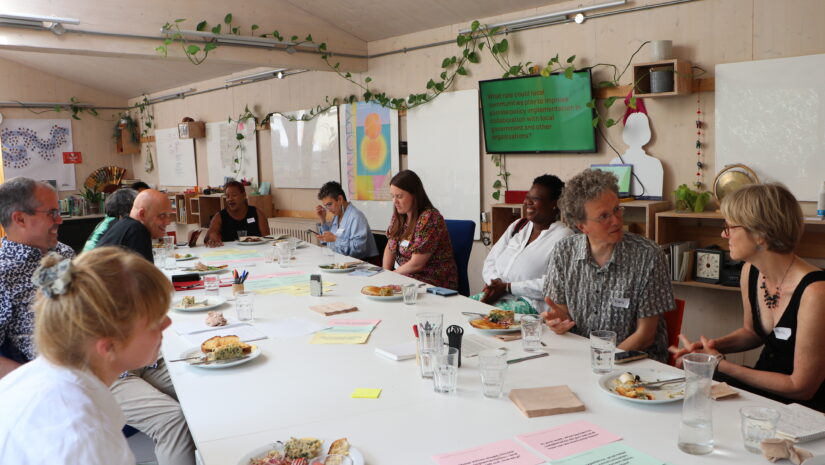As part of London Climate Action Week, Stby and Quicksand hosted a lunch discussion at our studio in London. We reimagined how climate policy is shaped, not as a top-down directive, but as a collaborative, participatory effort grounded in trust and lived experiences. Practitioners working at the intersection of climate, policy, design, and community engagement joined the discussion. They reflected on a critical gap: the meaningful participation of local communities and institutions in shaping and driving climate action.
Opening remarks
To set the discussion, Golden Lane Estate and the City of London shared insights into the interplay between grassroots initiatives and broader municipal goals.
Paul Lincoln, a resident of the Golden Lane Estate, shared how the post-World War II development, opened in 1957, embodies both the challenges and potential of community-led climate action. Designed with a modernist approach, the estate features green spaces, bold architecture, and shared amenities, now comprising 500 homes split between city tenants, owner-occupiers, and private renters. Residents face persistent issues such as dampness, mould, and energy inefficiency, which are made harder to address due to the estate’s Grade II listing and complex planning constraints. Despite these barriers, the ‘Imagine Golden Lane at Net Zero’ project has delivered tangible improvements, such as allotments set up by Golden Lane Residents’ Association and bike storage, demonstrating how residents often become experts in sustainability on planning, sometimes more informed than the authorities themselves.
Complementing this, Joanna Leyden from the City of London shared the City’s ambition to establish a circular economy framework by 2040, integrating reuse, low-waste construction, and sustainable procurement. She acknowledged challenges of engaging residents, particularly in more transient communities, but praised Golden Lane’s model of grassroots leadership. Inspired by its success, the City of London is now pursuing initiatives like the Library of Things and expanding the Green Champions Network.
The key question we collectively explored was:
What role could local communities play to improve climate policy implementation in collaboration with local governments and other organisations?
This discussion was not designed simply to share learnings and experiences, but to co-create insights that can shape future practice and policy.

Key themes from the discussion
How do we define community?
One of the most striking challenges highlighted was the absence of a shared language. Terms such as ‘net zero’, ‘priority intervention’ and ‘good outcome’ are open to varying interpretations, hindering shared understanding and collective progress. This ambiguity is particularly evident in the very definition of ‘community’.
We learnt that for civil servants, a community is often understood in pragmatic terms, defined by organisational capacity and the ability to engage with government structures. This definition inadvertently excludes those lacking formal ‘social capital’. In contrast, a more organic understanding of community is grounded in shared values, beliefs and lived realities.
At the same time, we should also recognise the advantage of not having rigid, shared definitions. This openness can allow more people and communities to participate in climate action on their terms, bringing in diverse perspectives and approaches that enrich the collective effort.
during COVID people were coming to the library to discuss and engage in DIY projects, which made a strong argument for bringing the Library of Things to the city to fulfil this need
Joanna Leyden (Circular Economy and Biodiversity Group Manager, City of London), while sharing the recent proposal on Library of Things (LoT) for the Barbican Library as part of the broader circular economy strategy
Making the invisible visible
Another complexity stems from the persistent, and often unexamined, assumption that expertise resides solely within government institutions. This perspective overlooks the rich ‘knowledge capital’ and ‘invisible expertise’ held by the residents and citizens themselves.
Indigenous knowledge of the environment, public health and resilience offers valuable insights for climate action, yet is frequently bypassed in official planning. Residents can also hold deep domain knowledge about planning, architecture, and local systems, which is often overlooked. This kind of expertise is not limited to cultural or lived experience, but can also be highly technical and project-specific. Projects like Land Body Ecologies illustrate the potential of surfacing and valuing these often unacknowledged forms of expertise.
There’s often an assumption that local authorities hold all the knowledge, while communities lack skills and need to be educated
Liz Hirst (Member of the Barbican Golden Lane Neighbourhood Forum) shares her experience of engaging with the local authorities
Participation and engagement with communities
The current landscape is marked by several barriers to effective engagement and collaboration, including: A ‘high bar for participation’, where communities must meet strict criteria to access funding or even to be heard. Bureaucratic processes that often feel like tokenistic ‘box-ticking’ exercises, which can make civil servants wary of engagement, seeing it as a potential ‘trap’. ‘Climate change exists first in the lived experience of communities, even before it shows up in the data’ – Riya Gokharu (Design Researcher, Stby).
These dynamics create ‘lopsided power dynamics’ where communities are consulted primarily on how to implement policies, rather than being involved in shaping them. Even when significant funding is available, rigid access requirements often exclude smaller, less formally organised groups. The pressure to ‘prove community legitimacy’ forces these groups to scramble for data or formal recognition, even when their knowledge is already deep and locally rooted.
we need to honour the distinctiveness of the different communities because they do not all have the same needs
Paul Lincoln (Founder, Imagine Golden Lane at Net Zero) shares his experience on defining the term community

Ingredients for meaningful collaboration
Despite the challenges, the discussion highlighted key ingredients for fostering more authentic, meaningful, and impactful collaboration in the future:
- Trust and a deep understanding of community needs are foundational. This requires a broadened understanding of both ‘expertise’ and ‘community’, and creating new, inclusive modes of engagement.
- Alternative channels of expression, beyond written responses, should be embraced. Storytelling, visual media, and creative methods can help make community knowledge visible and strengthen collective identity.
- Tangible, local issues often galvanise communities more effectively than abstract climate goals. For example, a shared project around bicycle parking, repair or public space (as shared by Stby) may engage people more than broader, strategic aims. The challenge lies in translating policy into relevance. ‘The city has a role to play in helping to educate people on that. And I think, right now, we’re probably not doing a good enough job of telling that story in a way that everyday people can relate to and understand.’ – Joanna Leyden (Circular Economy and Biodiversity Group Manager, City of London).
- Social capital, such as networks, problem-solving capacities, and access to knowledge, is a critical resource within communities. Recognising and supporting this capital enables more sustainable and empowered participation.
We showcased creative outputs through a transdisciplinary approach, which placed methodology at the centre, emphasising why creative and culturally embedded practices are critical to robust research
Alice Carey (Head of transdisciplinary research, Wellcome Collection) explained the value of creative outputs in the Land Body Ecologies project
The role of research in meaningful collaboration
The role of research in this ecosystem also demands reflection. Too often, it risks misalignment with immediate community priorities, yet when grounded in lived experience, research can amplify community voices and shape more responsive strategies. The example of Golden Lane Estate illustrates how hyper-local knowledge can inform and enrich broader climate action.
At the same time, it’s important to recognise that while researchers often operate within institutional agendas and constraints, there is a potential for genuine reciprocity. Even when interests diverge, communities seeking to engage with government and researchers seeking grounded foundations for their work can find a common ground through collaboration rooted in mutual benefit. For example, data can become a powerful medium through which communities are able to enter into meaningful dialogue with government actors.
if you’re working with a researcher, the real question is: how are they going to help you make better decisions?
Peter Baeck (Director of the Centre for Collective Intelligence Design, Nesta), reflecting on the role of research in collaboration with communities, reflecting and recognising that people in research often have their own biases.

Conclusion
Advancing meaningful climate action requires a fundamental shift in mindset. It calls for dismantling inherited assumptions, embracing a more expansive understanding of who holds knowledge, and actively creating equitable spaces for collaboration.
The power of conversations like these lies not just in reflection, but in connection, they open up opportunities, spark future collaborations, and lay the groundwork for ongoing engagement. Planning more follow-up conversations and exploring opportunities that emerge from connecting people will be essential to sustaining momentum and translating dialogue into action.
Only through such shifts can we bridge longstanding divides and fully unlock the potential of local communities as key agents in addressing our shared climate challenges.
We are grateful to all those who joined and contributed to this conversation. Their thoughtful contributions and experiences were instrumental in shaping the reflections and insights shared in this article.
Additional links shared during the discussion
Imagine Golden Lane at Net Zero, Library of Things, Reimagining Our Streets: Empowered by neighbourhood involvement, Bike parking consultation in London, Land Body Ecologies, Civic Square.
Participants
Joanna Leyden (Circular Economy and Biodiversity Group Manager at City of London), Paul Lincoln (Founder at Imagine Golden Lane at Net Zero), Sefinat Otaru (Project Manager at Cross River Partnership), Farah Ahmad (Climate Justice Advocate), Peter Baeck (Director of the Centre for Collective Intelligence Design at Nesta), Alice Carey (Head of transdisciplinary research at Wellcome Collection), Liz Hirst (Member at Barbican Golden Lane Neighbourhood Forum), Julia Crear (Head of Delivery and Technical Services at Living Streets), Patrick Larvie (Anthropologist), Beth Thoren (Director of Environmental Action at Patagonia).
